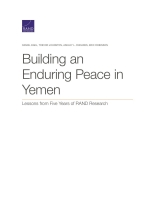by Daniel Egel, Trevor Johnston, Ashley L. Rhoades, Eric Robinson
What are the challenges facing efforts to achieve an enduring peace in Yemen?
How can the international community work constructively to overcome these challenges?
Yemen's civil war, in its sixth year as of 2021, has killed more than 250,000 people and created one of the worst humanitarian crises in the world today. It has become a proxy war between the Iranian-supported Houthis, United Arab Emirates–supported southern separatists, and the Saudi-supported internationally recognized government of Yemen. Despite years of United Nations–brokered negotiations, the antagonists have become increasingly entrenched and their positions seemingly irreconcilable. Time and again, negotiated cease-fires have proved unsustainable and once-promising confidence-building measures have failed to change the status quo, let alone achieve an enduring peace.
In this report, the authors trace the origins of the conflict, diagnose its costs, identify the underlying drivers of local conflict and mediation mechanisms, and describe how political influence, economic interests, and military ties have shaped the roles of key actors in the peace process. This analysis draws on five years of RAND Corporation research, including an expansive data collection effort in Yemen that assessed national conflict dynamics, regional influence networks, and local drivers of conflict and sources of resiliency, as well as 200 interviews with key military, government, community, and tribal actors across Yemen.
This research offers clear recommendations for ending the cycle of violence, failed peace talks, and broken promises. An enduring peace requires a coordinated international approach to security and the formation of an international body with the influence, mission, and resources to support what will be a decades-long process of reconciliation, reconstruction, and redevelopment.
Key Findings
Yemen's civil war has its origins in political and economic grievances, which have been persistent challenges in Yemen's modern history
Local grievances have undermined peace efforts, driving the unraveling of the Saudi-led coalition and contributing to the failure of the United Nations–led peace process.
These grievances shape the power of elites, who have the potential to help reconcile Yemen's divisions but are just as likely to play the role of spoiler, threatening the peace process.
The human costs of Yemen's civil war have been staggering, but a small but influential group of Yemenis has benefited from this simmering conflict
These war "beneficiaries," a blend of Yemen's traditional elite and newcomers, have exploited the instability and foreign assistance of all types for economic and political gain.
Understanding the winners and losers in the ongoing civil war is critical in designing effective and durable solutions to the current conflict.
Local actors—tribal sheiks, community leaders, and other notables—will likely be critical to sustaining the eventual peace agreement
Yemen's rich tradition of local, informal mediation has persisted throughout the conflict, with informal mediators both substituting for and complementing state authorities.
Neither informal (via local actors) or formal (via state authorities) mediation is sufficient on its own to sustain a peace agreement.
There are two possible pathways for peace efforts in Yemen
The first is to double down on current efforts that focus on national reconciliation.
The second is to refocus international peacebuilding and state-building efforts on Yemen's southern and eastern governorates, at least in the near term.
Recommendations
The international community should support Yemenis in developing a phased approach that provides for political resolution and economic stabilization while guaranteeing the security of citizens across Yemen's political and social strata. This phased approach should evolve from stabilization and relief in the near term, to a transitional period of institution building in the medium term, culminating in democratic consolidation and sustained development over the long term.
International actors must recognize that the pursuit of their own political, economic, and security interests cannot come at the expense of peace in Yemen.
The international community must be willing to make an unprecedented commitment to peace in Yemen, establishing an international body that has both the mission and resources to oversee and support what will be a decades-long process of reconciliation, reconstruction, and redevelopment. Just as a transitional Yemeni government requires broad inclusion, so too should this body, providing a voice to different political actors from across Yemen.

No comments:
Post a Comment